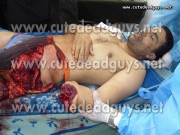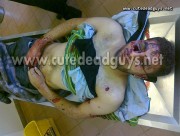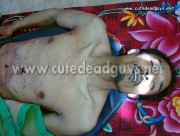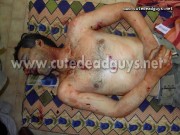- Joined
- Oct 7, 2008
- Messages
- 61,301
- Location
- Bulgaria





Confessions of a morgue worker from Tripoli, published anonymously today on BBC NEWS.
http://www.bbc.co.uk/news/world-africa-13785053
Anti-government protests began in the eastern Libyan city of Benghazi on 15-16 February, but spread rapidly westwards, reaching the capital, Tripoli, on 20 February. Officials denied anyone had been injured in clashes between security forces and protesters. But a former orderly at a Tripoli hospital mortuary, who has fled to Tunisia, told the BBC's Pascale Harter what he saw: Many young people went to protest in Green Square that day, and I believe almost no-one came back alive that night.
Between 600 and 700 people were killed. I know this because I carried the bodies into my hospital.
Each ambulance brought three or four dead people. And the ambulances just kept coming and going, like delivery vans dropping off goods.
Every one of Tripoli's ambulances - and we have a lot of them - was out on the roads, carrying dead bodies.
When the mortuary's refrigerators were full, we placed the bodies on tables and stretchers, or left them on the floor. It was the same at the other hospitals.
Col Gaddafi killed people who were demonstrating peacefully.
I know this because I saw it myself. I saw men in military uniform in pick-ups, their faces covered, shooting at people. It was like a scene from a horror film.
I think Col Gaddafi's forces were using anti-aircraft guns on people.
The people had gunshot wounds to their heads or chests. The bullets had exploded and some of the people had their heads blown open. I tried to pick up the pieces.
It was very confused at the hospital. We did not count the number of dead or register them. We just dropped the dead bodies and sent the wounded into surgery. No-one was taking down names or counting.
Also, the bodies were coming in without identity cards on them. But in one man's pocket I found a receipt with his name on it so I wrote it down.
The ambulances picked up all the dead and wounded they could, but then Col Gaddafi's forces started shooting at them.
I told one ambulance driver to fetch more wounded, but he said: "I don't want to die", and just threw down his keys down and walked away.
A military commander brought in a soldier in who had been shot in the stomach. He did not trust the doctors to operate, so he told another soldier to stay with the wounded man.
When the three of them came into the hospital the families of the protesters who had been killed or injured started chanting: "Down with Gaddafi."
The commander started firing his gun at the ceiling and everyone dropped to the floor.
A few days later, soldiers came and took the dead and injured.
They pulled off the patients' oxygen masks, yanked off the wires connected to their monitors, pulled out the drips and tubes, and took them away.
Some of them were sedated and were not conscious. Even the ones who were not did not have the chance to scream. The soldiers just piled them up with the dead in Toyota Land Cruisers and drove away.
None of the hospital staff dared speak out at all. What could we do? If I had done anything, I would have been piled up with the dead too.
We never found out what happened to the people taken by Col Gaddafi's forces. No-one had the courage to ask.
The next day, the government brought a Libyan state television crew to interview our doctors. They said: "No, there are no injured at the hospital, not even a person who has fallen off a ladder."
Before they took the dead, my colleague told me to take pictures of them so that their families would still be able to know what happened.
My phone did not have a camera so he gave me his. I took the keys to the mortuary and I took the pictures. Afterwards, I gave the phone back to him.
Libyan government officials insisted no-one had been hurt in the initial protests in Tripoli
A few days later I heard he was caught by the police. I do not know what they did with him.
When I heard, I ran away. I left Tripoli and went to join the revolutionaries in Zawiya. They helped me get to Tunisia through the desert.
I am now taking pills that allow me to fall asleep straight away. But whenever I am awake, I am haunted by images of Hajj Basset. He is always around - I even see him on the street.
Hajj Basset was the man who had a receipt in his pocket bearing his name. His head was blown apart. When we lifted him from the stretcher, some of his head fell away and bits of his brain spilt on the floor. I picked them up and tried to put his head back together afterwards.
He was about 45 years old. He was not a terrorist or taking the hallucinogenic drugs which Col Gaddafi claims the protesters were taking.
The receipt in his pocket was from a DIY shop.
Between 600 and 700 people were killed. I know this because I carried the bodies into my hospital.
Each ambulance brought three or four dead people. And the ambulances just kept coming and going, like delivery vans dropping off goods.
Every one of Tripoli's ambulances - and we have a lot of them - was out on the roads, carrying dead bodies.
When the mortuary's refrigerators were full, we placed the bodies on tables and stretchers, or left them on the floor. It was the same at the other hospitals.
Col Gaddafi killed people who were demonstrating peacefully.
I know this because I saw it myself. I saw men in military uniform in pick-ups, their faces covered, shooting at people. It was like a scene from a horror film.
I think Col Gaddafi's forces were using anti-aircraft guns on people.
The people had gunshot wounds to their heads or chests. The bullets had exploded and some of the people had their heads blown open. I tried to pick up the pieces.
It was very confused at the hospital. We did not count the number of dead or register them. We just dropped the dead bodies and sent the wounded into surgery. No-one was taking down names or counting.
Also, the bodies were coming in without identity cards on them. But in one man's pocket I found a receipt with his name on it so I wrote it down.
The ambulances picked up all the dead and wounded they could, but then Col Gaddafi's forces started shooting at them.
I told one ambulance driver to fetch more wounded, but he said: "I don't want to die", and just threw down his keys down and walked away.
A military commander brought in a soldier in who had been shot in the stomach. He did not trust the doctors to operate, so he told another soldier to stay with the wounded man.
When the three of them came into the hospital the families of the protesters who had been killed or injured started chanting: "Down with Gaddafi."
The commander started firing his gun at the ceiling and everyone dropped to the floor.
A few days later, soldiers came and took the dead and injured.
They pulled off the patients' oxygen masks, yanked off the wires connected to their monitors, pulled out the drips and tubes, and took them away.
Some of them were sedated and were not conscious. Even the ones who were not did not have the chance to scream. The soldiers just piled them up with the dead in Toyota Land Cruisers and drove away.
None of the hospital staff dared speak out at all. What could we do? If I had done anything, I would have been piled up with the dead too.
We never found out what happened to the people taken by Col Gaddafi's forces. No-one had the courage to ask.
The next day, the government brought a Libyan state television crew to interview our doctors. They said: "No, there are no injured at the hospital, not even a person who has fallen off a ladder."
Before they took the dead, my colleague told me to take pictures of them so that their families would still be able to know what happened.
My phone did not have a camera so he gave me his. I took the keys to the mortuary and I took the pictures. Afterwards, I gave the phone back to him.
Libyan government officials insisted no-one had been hurt in the initial protests in Tripoli
A few days later I heard he was caught by the police. I do not know what they did with him.
When I heard, I ran away. I left Tripoli and went to join the revolutionaries in Zawiya. They helped me get to Tunisia through the desert.
I am now taking pills that allow me to fall asleep straight away. But whenever I am awake, I am haunted by images of Hajj Basset. He is always around - I even see him on the street.
Hajj Basset was the man who had a receipt in his pocket bearing his name. His head was blown apart. When we lifted him from the stretcher, some of his head fell away and bits of his brain spilt on the floor. I picked them up and tried to put his head back together afterwards.
He was about 45 years old. He was not a terrorist or taking the hallucinogenic drugs which Col Gaddafi claims the protesters were taking.
The receipt in his pocket was from a DIY shop.
